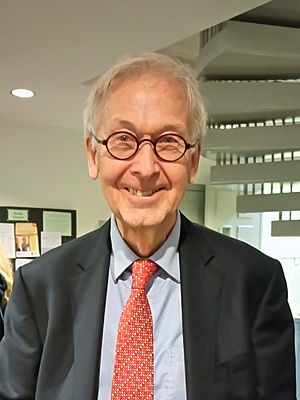Colin Humphreys facts for kids
Quick facts for kids
Sir Colin Humphreys
|
|
|---|---|

Colin Humphreys in Cambridge, 2015
|
|
| Born |
Colin John Humphreys
24 May 1941 |
| Education | Luton Grammar School |
| Alma mater | Imperial College London (BSc) University of Oxford (MA) University of Cambridge (PhD) |
| Awards | A. A. Griffith Medal and Prize (2001) Queen’s Medal (2022) |
| Scientific career | |
| Fields | Materials science Graphene Gallium Nitride Electron microscopy Science and religion |
| Institutions | Queen Mary University of London University of Cambridge Royal Institution |
| Thesis | Aspects of multiple beam electron diffraction and X-ray diffraction topography (1969) |
| Doctoral students | Amanda Petford-Long |
Sir Colin John Humphreys, born on May 24, 1941, is a British scientist. He is a physicist and also studies the Bible as a hobby. He is a professor of Materials Science at Queen Mary University of London.
He used to be a professor at the University of Cambridge and the Royal Institution in London. From 2002 to 2003, he was the President of the Institute of Materials, Minerals and Mining. Sir Colin studies many things. He looks at materials using special microscopes. He also researches materials like gallium nitride, which is used in electronics. He also studies very strong materials for airplanes and superconductors. When he is not working as a scientist, he enjoys studying the Bible.
Contents
Education and Early Life
Colin Humphreys went to Luton Grammar School. He then studied at Imperial College London. He earned his PhD from Churchill College, Cambridge in 1969. He also received a Master of Arts degree from Jesus College, Oxford.
Career and Scientific Research
Sir Colin Humphreys is a materials scientist. He has done important work using electron microscopy to study materials called semiconductors.
Gallium Nitride and LEDs
His research on gallium nitride (GaN) is very important. This material helps us understand how to make better electronics. GaN can be used in transistors, which are like tiny switches in computers. It can also make bright light.
GaN is great for LEDs (Light Emitting Diodes). LEDs save a lot of energy. Sir Colin helped create low-cost, energy-saving GaN-on-silicon LEDs. These LEDs are now being made based on his ideas. Using GaN LED lighting could save a lot of money on electricity.
Sir Colin is also a member of the John Templeton Foundation. He is part of the Advisory Council for the Campaign for Science and Engineering.
Biblical Studies and Research
Besides his science work, Sir Colin also studies the Bible. He has written about some interesting ideas.
The Last Supper's Date
In 2011, Sir Colin wrote a book called The Mystery of the Last Supper. In it, he suggested that the Last Supper happened on a Wednesday. Many people traditionally believe it was on a Thursday. He thinks that different calendars were used when the Bible was written.
He believes that the gospels of Matthew, Mark, and Luke used an older Jewish calendar. The Gospel of John used a newer one. If the Last Supper was on a Wednesday, it would give more time for events before the crucifixion on Friday. Sir Colin suggested the actual date for the Last Supper was April 1, 33 AD.
Sun Standing Still
In 2017, Sir Colin and Graeme Waddington wrote a paper. They suggested a scientific reason for a story in the Hebrew Bible. This story is about the sun standing still over Gibeon. This happened during a battle involving the Israelites. They think it might have been an annular eclipse. This type of eclipse happened on October 30, 1207 BCE.
Awards and Recognition
Sir Colin Humphreys has received many awards for his work.
- In 1996, he became a Fellow of the Royal Academy of Engineering.
- He won the Institute of Physics Kelvin Medal and Prize in 2000.
- In 2001, he received the A. A. Griffith Medal and Prize.
- He was awarded a CBE in 2003 for his contributions to science.
- He was made a Knight in 2010.
- In 2011, he was elected a Fellow of the Royal Society.
- In 2015, he became an Honorary Fellow of the Royal Microscopical Society.
 | Laphonza Butler |
 | Daisy Bates |
 | Elizabeth Piper Ensley |

